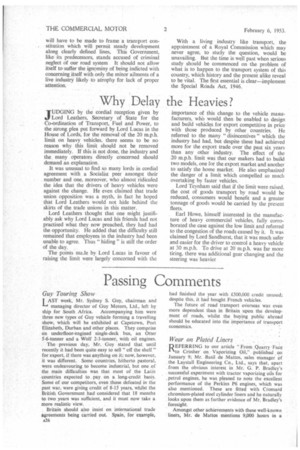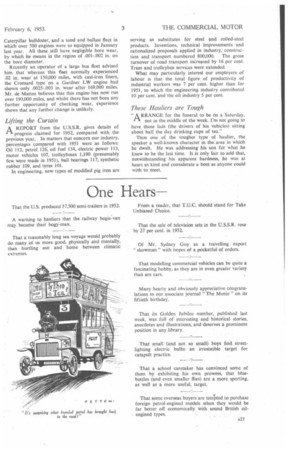Passing Comments
Page 28

Page 29

If you've noticed an error in this article please click here to report it so we can fix it.
Guy Touring Show
LAST week, Mr. Sydney S. Guy, chairman and managing director of Guy Motors, Ltd., left by ship for South Africa. Accompanying him were three new types of Guy vehicle forming a travelling show, which will be exhibited at Capetown, Port Elizabeth, Durban and other places. They comprise an underfloor-engined single-deck bus, an Otter 5-6-tonner and a Wolf 2-3-tonner, with oil engines.
The previous day, Mr. Guy stated that until recently it had been quite easy to sell "off the shelf" for export, if there was anything on it; now, however, it was different. Some countries, hitherto pastoral, were endeavouring to become industrial, but one of the main difficulties was that most of the Latin countries expected to pay on a long-credit basis. Some of our competitors, even those defeated in the past war, were giving credit of 8-15 years, whilst the British Government had considered that 18 months to two years was sufficient, and it must now take a more realistic view.
Britain should also insist on international trade agreements being carried out. Spain, for example, A26
had finished the year with E500,000 credit unused; despite this, it had bought French vehicles.
The future of road transport overseas was even more dependent than in Britain upon the development of roads, whilst the buying public abroad should be educated into the importance Of transport economics.
Wear on Plated Liners • , •
tip EFERRING to our article "From .Quarry • Face ''to Crusher on: Vaporizing Oil," published on January 9; Mr. Basil de Mattos, sales manager of the Laystall Engineering Co., Ltd., says that, apart from the obvious interest in Mr. G. P. Bradley's successful experiment with tractor vaporizing oils for .petrol engines, he was pleased to note the excellent performance of the Perkins P6 engines, which was also mentioned. These are fitted with Cromard chromium-plated steel cylinder liners and he naturally looks upon them as further evidence of Mr. Bradley's foresight.
Amongst other achievements with these well-known liners, Mr. de Mattos mentions 9,000 hours in a
Caterpillar bulldozer, and a sand and ballast fleet in which over 500 engines were so equipped in January last year. All these still have negligible bore wear, by which he means in the region of .001-.002 in. on the bore diameter.
Recently an operator of a large bus fleet advised him that whereas this Net normally experienced .02 in. wear at 150,000 miles, with cast-iron liners, the Cromard type on a Gardner LW engine had shown only .0025-.003 in. wear after 169,000 miles. Mr. de Mattos believes that this engine has now run over 190,000 miles, and whilst there has not been any further opportunity of checking wear, experience shows that any further change is unlikely.
Lifting the Curtain
A REPORT from the U.S.S.R. gives details of 4-1 progress claimed for 1952, compared with the previous year. In matters that eoncern our industry, percentages compared with 1951 were as follows: Oil 112, petrol 126, oil fuel 134, electric power 113, motor vehicles 107, trolleybuses 1,190 (presumably few were made in 1951), ball bearings 117, synthetic rubber 109, and tyres 101.
In engineering, new types of modified pig iron are serving as substitutes for steel and rolled-steel products, Inventions, technical improvements and rationalized proposals applied in industry, constru;:tion and transport numbered 800,000. The gross turnover of road transport increased by 16 per cent. Tram and trolley bus services were extended.
What may particularly interest our employers of labour is that the total figure of productivity of industrial workers was 7 per cent, higher than for 1951, to which the engineering industry contributed 10 per cent. and the oil industry 5 per cent.
These Hauliers are Tough
"ARRANGE for the funeral to be on a Saturday, not in the middle of the week. I'm not going to have those lads (the drivers of his vehicles) sitting about half the day drinking cups of tea."
Thus one of the tougher type of haulier, the speaker a well-known character in the area in which he dwelt. He was addressing his son for what he knew to be the last time. It is only tair to add that, notwithstanding his apparent hardness, he was at heart as kind and considerate a boss as anyone could wish to meet.




























































































